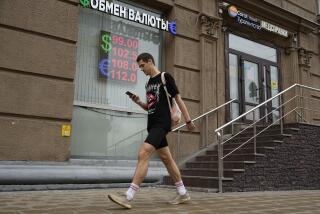The Great Ruble Grab May Come Up Empty : Soviet Union: This ‘reform’ will wreck everyday life, and Gorbachev will pay for it.
- Share via
Mikhail S. Gorbachev’s reform coalition has broken apart, and one consequence is a disastrous “currency reform” that amounts to the confiscation of about one-third of the rubles held by households and firms. This confiscation will disrupt the unofficial economy on which both households and managers increasingly rely, and perhaps result in Gorbachev’s fall.
Fifty- and 100-ruble denominations are being abruptly withdrawn from circulation. Citizens are allowed to exchange the equivalent of one month’s salary in large bills; the rest become worthless. In addition, the reform places a 500-ruble monthly limit (about $25 at the black-market rate) on withdrawals from savings accounts.
The stated purpose of this reform is to remove the “ruble overhang” or excess liquidity from the economy and to curtail private transactions in black markets. The new hard-line Soviet government believes that the large stock of currency is the cause of inflation and that the large notes are the currency of unofficial markets.
In practice this reform strikes at the limited property rights Soviet citizens have and removes their cushion against hard times. Black-market operators keep much of their wealth in the form of stocks of goods and foreign currencies. The people who will be hurt are those likeAleksandra Korotkova, a 62-year-old janitor whose life savings of 3,000 rubles are stashed away in large bills.
Distrusting the state banking system, many people keep their savings in cash form in the mattress, so to speak. Unless they can beat the system by exchanging the permissible amount at many different banks, they will simply lose their savings, depriving them of the ability to purchase food and necessities in unofficial markets.
Indeed, the “reform” is an effort to deprive Soviet citizens of the private, informal markets that make their life tolerable. The authorities are trying to force economic transactions out of unofficial markets and into the official distribution system. They believe that this is the way to overcome the shortages in the state stores.
However, the failures of the official distribution system are notorious, and the private distribution system is what fills in all the gaps. Closing it down will simply wipe out essential distribution channels and increase the likelihood of famine and hardship this winter. The political fallout for Gorbachev could be catastrophic.
Ironically, Soviet hard-liners can claim as their inspiration the December report by the World Bank and International Monetary Fund that advises: “In principle, the ‘monetary overhang’ can be tackled through a monetary reform, which would confiscate or freeze a part of financial assets held by households and enterprises.” Thus, the Soviet government can claim that it is following Western advice to seize the currency of its citizens as an anti-inflationary policy.
This approach to fighting inflation is nonsensical. Inflation is not caused by the stock of money but by the rate at which the government expands the money supply. Both in Brazil and the Soviet Union the government issues new money to cover the deficits in the budgets of state-run firms. As long as government is creating new money to pay its bills, inflationary pressure is not abated. Confiscating money in private hands or freezing bank balances simply prevents goods and services from being brought to market and interferes with the economy’s ability to adjust to inflation.
It is possible that the currency reform will simply be ignored. As the 50- and 100-ruble notes are spent only in black markets anyway, they may continue as the currency of private transactions even though they are no longer acceptable in state stores, where there is nothing to buy anyhow. Just as the dollar and other foreign currencies are the basis for Soviet transactions even though they are not legal tender, the large ruble notes may continue to be used despite their lack of legal basis.
More to Read
Sign up for Essential California
The most important California stories and recommendations in your inbox every morning.
You may occasionally receive promotional content from the Los Angeles Times.













